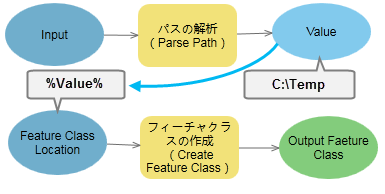概要
The Parse Path tool parses the input into its file, path, name, or extension. The output can be used as inline variable in the output name of other tools.
レガシー:
This is a deprecated tool. This functionality has been replaced by the new Parse Path tool.
使用法
このツールは、ModelBuilder で使用するためのツールで、Python スクリプトでは使用できません。
Parsing results are controlled by the Parse Type parameter. Example: If the input to the Parse Path tool is C:\ToolData\InputFC.shp, then
Parse Type Result File name and extension InputFC.shp File path C:\ToolData File name InputFC File extension shp The same functionality can be accessed in scripting with the Python os module. For example if you pass an input variable:
Input = "C:\ToolData\InputFC.shp", then
- To get the file InputFC.shp
import os os.path.basename(Input) - To get the file path C:\ToolData
import os os.path.dirname(Input) - To get the file name InputFC
import os os.path.basename(Input).rstrip(os.path.splitext(Input)[1]) - To get the file extension shp
import os os.path.splitext(Input)[1].lstrip(".")
- To get the file InputFC.shp
The output of Parse Path is a string and cannot be connected directly as an input to the tools such as Create Feature Class in parameters like Feature Class Location which requires a workspace data type as input. Use %Value% inline variable substitution in such cases as shown below:

構文
arcpy.mb.ParsePath(in_data_element, {parse_type})| パラメーター | 説明 | データ タイプ |
in_data_element | Input values that you want to parse. | Any Value |
parse_type (オプション) | Specifies the parse type. Given an input value of C:\ToolData\InputFC.shp:
| String |
派生した出力
| 名前 | 説明 | データ タイプ |
| value |
環境
ライセンス情報
- Basic: はい
- Standard: はい
- Advanced: はい